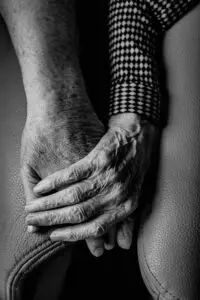
In Nevada, the Department of Health and Human Services Nevada Division of Public and Behavioral Health (DPBH) is responsible for many different forms of long-term care facility oversight, including logging and investigating complaints of elder abuse or poor facility quality.
After a review of different forms of elder abuse, this article will discuss the regulatory agencies involved in maintaining quality of care in Nevada. It will also provide clarification on the differences between elder abuse and medical malpractice.
Types of Elder Abuse
Elder abuse can take many different forms. Physical elder abuse is often what individuals think of when they discuss elder abuse. Any sign of physical injury (e.g. bruises, cuts, etc.) that cannot be explained can be considered grounds for investigating potential elder abuse in a long-term care facility. In addition, withholding or improperly administering medication can also be considered a form of physical elder abuse.
Other less-obvious forms of elder abuse include emotional abuse and financial abuse. Emotional abuse can include social isolation, yelling, threatening, and insulting facility residents. Financial abuse includes charging for services not actually rendered or accessing a resident’s bank account information without their consent.
When investigating signs of any kind of elder abuse, families should consult with an experienced local elder abuse attorney to ensure they are following the proper protocols.
Submitting a Complaint in Nevada
When families in Nevada are concerned about the quality of care that a resident is receiving in a long-term care facility, they are advised to submit a complaint to the state DPBH. This department will investigate the claim and hopefully provide a prompt and satisfactory solution to the concern. However, in the event that concerns are not adequately addressed, families are often advised to contact a personal injury attorney that specializes in elder abuse in order to discuss proceeding with civil litigation against the facility in question.
Elder Abuse Versus Medical Malpractice
Because long-term care facilities and nursing homes provide various levels of medical care to residents, families are sometimes unsure if the harm that is being caused to the resident is due to abuse or medical malpractice.
Medical malpractice often involves an unintended harm caused to patients at the hands of a medical provider due to that provider’s negligence. The medical provider may have had every intent of providing adequate care, but due to their negligence or incompetence, they failed in their duty of care to the patient.
In comparison to medical malpractice, elder abuse often has a premeditated intent to cause harm to a resident, whether that harm is physical, emotional, financial, or some combination of all three. Elder abuse can be committed on a much more regular basis by multiple different types of staff members employed at a given long-term care facility. Families therefore need to maintain a keen sense of awareness when touring different facilities. Researching past complaints and lawsuits filed against a facility will help families get a better sense of where their loved one is most likely to be safe from harm.
Getting Professional Legal Representation
For years, the attorneys at H&P Law have been helping families in Las Vegas and throughout Nevada as they navigate civil litigation involving elder abuse to loved ones. Contact H&P Law today to discuss your case and get insight and guidance.




